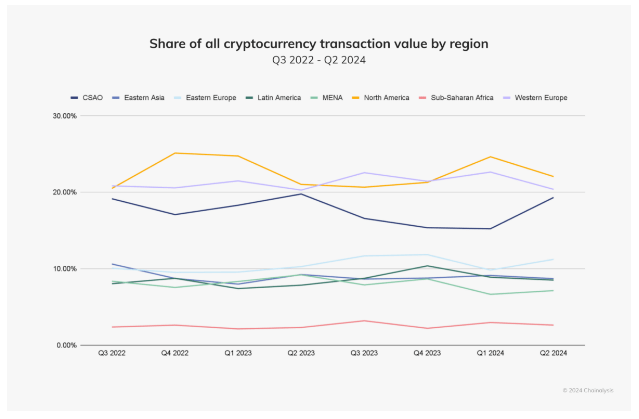Argentina Leads Latin America With $91 Billion Crypto Inflows – Details
With over $90 billion worth in crypto inflows, Argentina has been declared Latin America’s leading market for cryptocurrency, dethroning Brazil. The growing instability and unpredictability in the economy as well as inflation has forced people of the country to explore the decentralized world of crypto, immediately making them key players in their region. In fact, it is responsible for almost 25% of the total crypto inflows of Latin America, outweighing that of Brazil at 18%, data from Chainalysis shows. It’s the need for an alternative to banking that drove the nation to adapt digital assets and decentralized banking.
Economic Uncertainty Driving Adoption
Its crypto dominance came from their fair share of economic struggles, problems such as inflation rates due to the fluctuating value of currency. The allure of cryptocurrency was great in the country, with cryptocurrencies such as Bitcoin offering more stable value and worth compared to the rapidly declining local currency. The use of crypto has been rampant in the country, starting out with only investments, yet became accepted enough to be used for day-to-day transactions.
For many Argentinians, cryptocurrencies have become a lifeline as an increasing number of them are finding shelter from the current inflation through the use of stablecoins, like Tether (USDT). Even transactions related to basic things, like remittances between family members living abroad, are increasingly finding their way through crypto platforms that facilitate faster and cheaper alternatives compared to traditional services offering remittances.
Argentina’s Growing Crypto Ecosystem
The lead and gap that Argentina has in the crypto market of Latin America is not out of economic necessity but also about growing as a nation. A home for several blockchain startups and crypto exchanges working hand-in-hand for building more stable and durable economies-from DeFi projects to NFT marketplaces, the Argentinian tech community opens up to possibilities offered by the blockchain.
In respect to this, crypto’s increased influence in the country has reached the local governments themselves; for instance, Buenos Aires has been considering accepting crypto for transaction purposes, like paying taxes, further solidifying proof of its impact on the nation’s economy. While the central bank remains continuously plagued, crypto’s disappearance is quite impossible.

What’s Next For Argentina?
This brings into question the future of Argentina, which has risen to the top in a very short period of time. Will it continue with its dominance to grow as a staple innovative hub for the crypto industry? Seeing as crypto has saved them from their financial struggles, plus a tech-savvy population with a strong appetite for financial solutions outside of traditional means, the answer might already have been made. The future of the Argentine crypto market looks bright.
Regulatory uncertainty remains a big wall that both users and businesses have to try to scale in this crypto space. With the government clearly trying to grapple with how to deal with this rapidly growing industry, it is not going to be a smooth ride. Nevertheless, the crypto success of Argentina has not shown any sign of abatement–a true testimony to the fact that financial innovation, when given an appropriate opportunity, can grow and thrive even in times of economic uncertainty.
Featured image from Pexels, chart from TradingView






